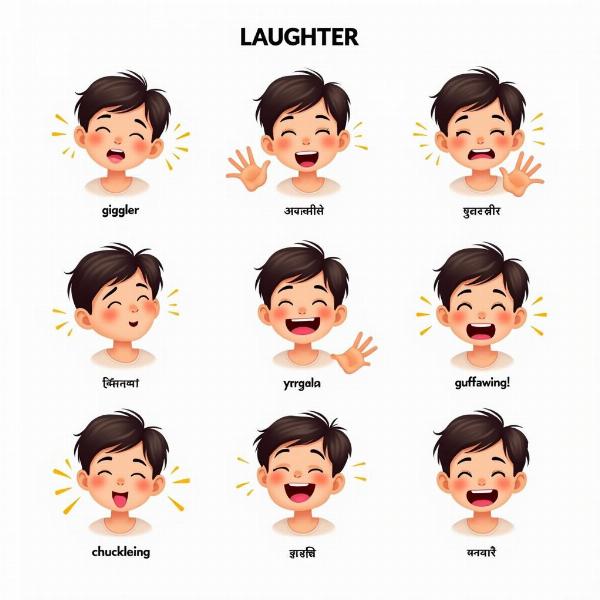Understanding the nuances of laughter in Hindi can enrich your grasp of the language and culture. “You are laughing” translates directly to “tum has rahe ho” (तुम हँस रहे हो) in Hindi. However, simply knowing this literal translation doesn’t fully capture the range of expressions and implications associated with laughter in the Hindi language. Let’s delve deeper into the various ways to express “you are laughing” in Hindi and explore the cultural context surrounding this common human experience.
Different Ways to Say “You Are Laughing” in Hindi
While “tum has rahe ho” (तुम हँस रहे हो) is a common and versatile translation, Hindi offers several other ways to express “you are laughing,” each carrying its own subtle shades of meaning and appropriate for different levels of formality.
- Aap has rahe hain (आप हँस रहे हैं): This is the respectful form of “you are laughing,” used when addressing elders or individuals you wish to show deference to. Using the formal “aap” instead of “tum” demonstrates politeness and respect, a crucial aspect of Hindi communication.
- Has rahe ho? (हँस रहे हो?): By adding a question mark, this phrase becomes “Are you laughing?” It’s a simple yet effective way to inquire about someone’s amusement.
- Kyun has rahe ho? (क्यों हँस रहे हो?): This translates to “Why are you laughing?” and is a common question when someone’s laughter seems unexpected or out of place.
- Hanste hue (हँसते हुए): This is the participle form, meaning “laughing,” which can be used in various sentence constructions. For example, “hanste hue bole” (हँसते हुए बोले) means “said while laughing.”
These are just a few examples, and the specific phrase you use will depend on the context of the conversation and your relationship with the person you’re speaking to.
The Cultural Significance of Laughter in India
Laughter plays a significant role in Indian culture, often associated with joy, celebration, and social bonding. It’s a common sight to see people laughing together in groups, sharing jokes and stories. Humor is deeply embedded in Indian society, and laughter serves as a powerful tool for connecting with others and navigating social situations.
However, like any other form of expression, laughter in India is also governed by certain cultural norms. For example, excessive or boisterous laughter, especially by women, might be considered inappropriate in some traditional settings. Understanding these nuances can help you avoid unintentional cultural faux pas.
Beyond the Basics: Exploring Different Types of Laughter
Hindi, like English, recognizes various types of laughter, each with its own unique connotation. While there might not be direct one-to-one translations, the essence can often be captured using descriptive phrases. Consider these examples:
- Giggling (Khilkhilana – खिलखिलाना): This light, often suppressed laughter is usually associated with amusement or nervousness.
- Chuckling (Muskurahut – मुस्कुराहट with a sound): A quiet, gentle laugh that expresses contentment or mild amusement. Sometimes, simply a smile (“muskurahat”) can convey a similar sentiment.
- Guffawing (Jor se hansna – ज़ोर से हँसना): Loud, boisterous laughter, often expressing great amusement or mirth.
 Different Types of Laughter and their Hindi Equivalents
Different Types of Laughter and their Hindi Equivalents
How to Use “You Are Laughing” in Everyday Conversations
Here are some examples of how you can use “you are laughing” in everyday Hindi conversations:
- Informal: “Are you laughing at my joke?” (Mera mazak sunke has rahe ho? – मेरा मज़ाक सुनके हँस रहे हो?)
- Formal: “Sir, you are laughing. Is something amusing?” (Aap has rahe hain. Kya koi mazedaar baat hai? – आप हँस रहे हैं। क्या कोई मज़ेदार बात है?)
- Observational: “She was laughing while reading the book.” (Woh kitaab padhte hue has rahi thi. – वह किताब पढ़ते हुए हँस रही थी।)
Why Knowing the Meaning of “You Are Laughing” is Important
Understanding the nuances of “you are laughing” in Hindi goes beyond simple translation. It opens a window into the cultural context of laughter and provides you with the tools to communicate effectively and respectfully in various social situations.
Conclusion
Learning the various ways to say “you are laughing” in Hindi, along with their cultural implications, will undoubtedly enhance your communication skills and deepen your understanding of Indian culture. From casual conversations to formal interactions, knowing how to express and interpret laughter will help you navigate social situations with greater ease and sensitivity.
FAQ
- What is the most common way to say “you are laughing” in Hindi? The most common way is “tum has rahe ho” (तुम हँस रहे हो) for informal situations and “aap has rahe hain” (आप हँस रहे हैं) for formal situations.
- Is there a difference between laughing and smiling in Hindi? Yes, “hansna” (हँसना) means to laugh, while “muskurana” (मुस्कुराना) means to smile.
- Are there different words for different types of laughter in Hindi? While not always direct translations, Hindi uses descriptive words like “khilkhilana” (खिलखिलाना) for giggling and “jor se hansna” (ज़ोर से हँसना) for guffawing.
- Is it considered rude to laugh loudly in India? While laughter is generally appreciated, excessive or boisterous laughter, especially in formal or traditional settings, might be considered inappropriate.
- How can I learn more about Hindi expressions related to emotions? Exploring Hindi literature, films, and music, along with engaging in conversations with native speakers, can provide valuable insights into the nuances of emotional expression in Hindi.
Meaning-Hindi.in: Your Partner for Expert Hindi Translation
Meaning-Hindi.in is your one-stop solution for all your Hindi translation needs. We offer a wide range of translation services, from business and legal documents to technical manuals and website localization. Our team of expert Hindi translators ensures accuracy, cultural sensitivity, and timely delivery. Whether you need business document translation, legal document certification, technical manual adaptation, website localization, or educational material translation, Meaning-Hindi.in provides high-quality services. We also specialize in expedited and specialized translations for diverse industries. Contact us today for a free quote! Email: [email protected], Phone: +91 11-4502-7584. Let Meaning-Hindi.in help you bridge the language gap and achieve your communication goals.